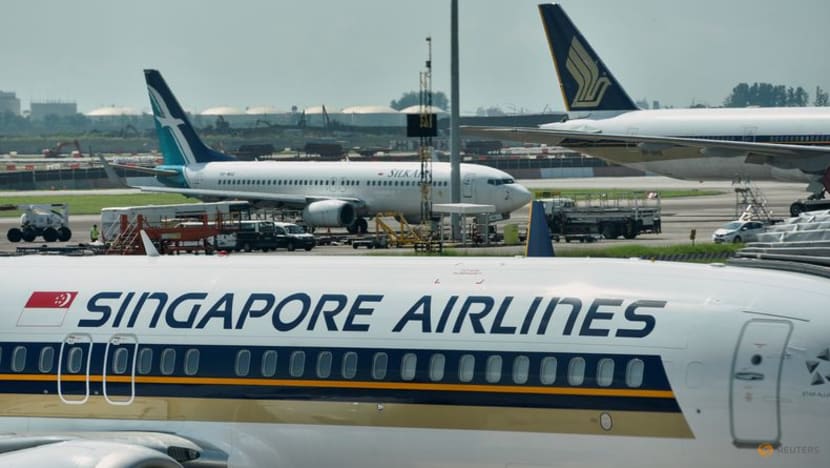Singapore Airlines cancels all flights to Dubai until Wednesday amid Middle East conflict
Commercial airlines around the world are weighing how long to suspend Middle East flights as the Israel-Iran conflict enters a new phase.

Singapore Airlines planes sit on the tarmac at Changi Airport in Singapore. (File photo: Reuters/Caroline Chia)
SINGAPORE: Singapore Airlines (SIA) has cancelled all flights between Singapore and Dubai until Wednesday (Jun 25) as the conflict between Israel and Iran continues.
In a notice on its website, the Singapore carrier announced that the cancellations followed “a security assessment of the geopolitical situation in the Middle East”.
The six cancelled flights are:
- SQ494 departing Singapore for Dubai on Monday at 3.10pm
- SQ495 departing Dubai for Singapore on Monday at 7.45pm
- SQ494 departing Singapore for Dubai on Tuesday at 3.10pm
- SQ495 departing Dubai for Singapore on Tuesday at 7.45pm
- SQ494 departing Singapore for Dubai on Wednesday at 3.10pm
- SQ495 departing Dubai for Singapore on Wednesday at 7.45pm
The airline had earlier cancelled flights between Singapore and Dubai on Sunday as a result of the conflict.
“SIA will be contacting all affected customers to inform them about the flight cancellation,” said the airline.
“Customers affected by the flight cancellations will be reaccommodated on alternative flights or can seek a full refund of the unused portion of their ticket.”
It added that customers who booked their flights directly can use the airline’s Assistance Request Form to seek a refund.
“For bookings made through travel agents or partner airlines, customers are advised to contact their travel agent or purchasing airline directly for assistance,” said SIA.
“As the situation remains fluid, other SIA flights between Singapore and Dubai may be affected,” it added.
Commercial airlines around the world are weighing how long to suspend Middle East flights as a conflict which has already cut off major flight routes entered a new phase after the US attacked key Iranian nuclear sites and Tehran vowed to defend itself.
The usually busy airspace stretching from Iran and Iraq to the Mediterranean has been largely empty of commercial air traffic for 10 days since Israel began strikes on Iran on Jun 13, as airlines divert, cancel and delay flights through the region due to airspace closures and safety concerns.
New cancellations of some flights by international carriers in recent days to usually resilient aviation hubs like Dubai, the world's busiest international airport, and Qatar's Doha, show how aviation industry concerns about the region have escalated.
Australia-based Flight Centre Travel Group said it is getting a small number of customer requests to route journeys to Europe away from Middle Eastern hubs.
"The most common transfer hubs that we're seeing requested are Singapore, Hong Kong, China, Johannesburg, or even direct between Perth and London," said Graham Turner, CEO of Australia-based Flight Centre Travel Group.
With Russian and Ukrainian airspace also closed to most airlines due to years of war, the Middle East had become a more important route for flights between Europe and Asia. Amid missile and air strikes during the past 10 days, airlines have routed north via the Caspian Sea or south via Egypt and Saudi Arabia.
Added to increased fuel and crew costs from these long detours and cancellations, carriers also face a potential hike in jet fuel costs as oil prices rise following the US attacks.
AIRSPACE RISKS
Proliferating conflict zones are an increasing operational burden on airlines, as aerial attacks raise worries about accidental or deliberate shoot-downs of commercial air traffic.
Location spoofing and GPS interference around political hotspots, where ground-based GPS systems broadcast incorrect positions which can send commercial airliners off course, are also a growing issue for commercial aviation.
Flightradar24 told Reuters it had seen a "dramatic increase" in jamming and spoofing in recent days over the Persian Gulf. SkAI, a Swiss company that runs a GPS disruption map, late on Sunday said it had observed more than 150 aircraft spoofed in 24 hours there.
Safe Airspace, a website run by OPSGROUP, a membership-based organisation that shares flight risk information, noted on Sunday that US attacks on Iran's nuclear sites could heighten the threat to American operators in the region.
This could raise additional airspace risks in Gulf states like Bahrain, Kuwait, Oman, Qatar, Saudi Arabia and the United Arab Emirates, it said.
In the days before the US strikes, American Airlines suspended flights to Qatar, and United Airlines and Air Canada did the same with flights to Dubai. They have yet to resume.
While international airlines are shying away from the region, local carriers in Jordan, Lebanon and Iraq are tentatively resuming some flights after widespread cancellations.
Israel is ramping up flights to help people return home, and leave. The country's Airports Authority says that so-called rescue flights to the country would expand on Monday with 24 a day, although each flight would be limited to 50 passengers.
From Monday, Israeli airlines will start to operate outbound flights from Israel, the authority said.
Israeli airline El Al on Sunday said it had received applications to leave the country from about 25,000 people in about a day.














